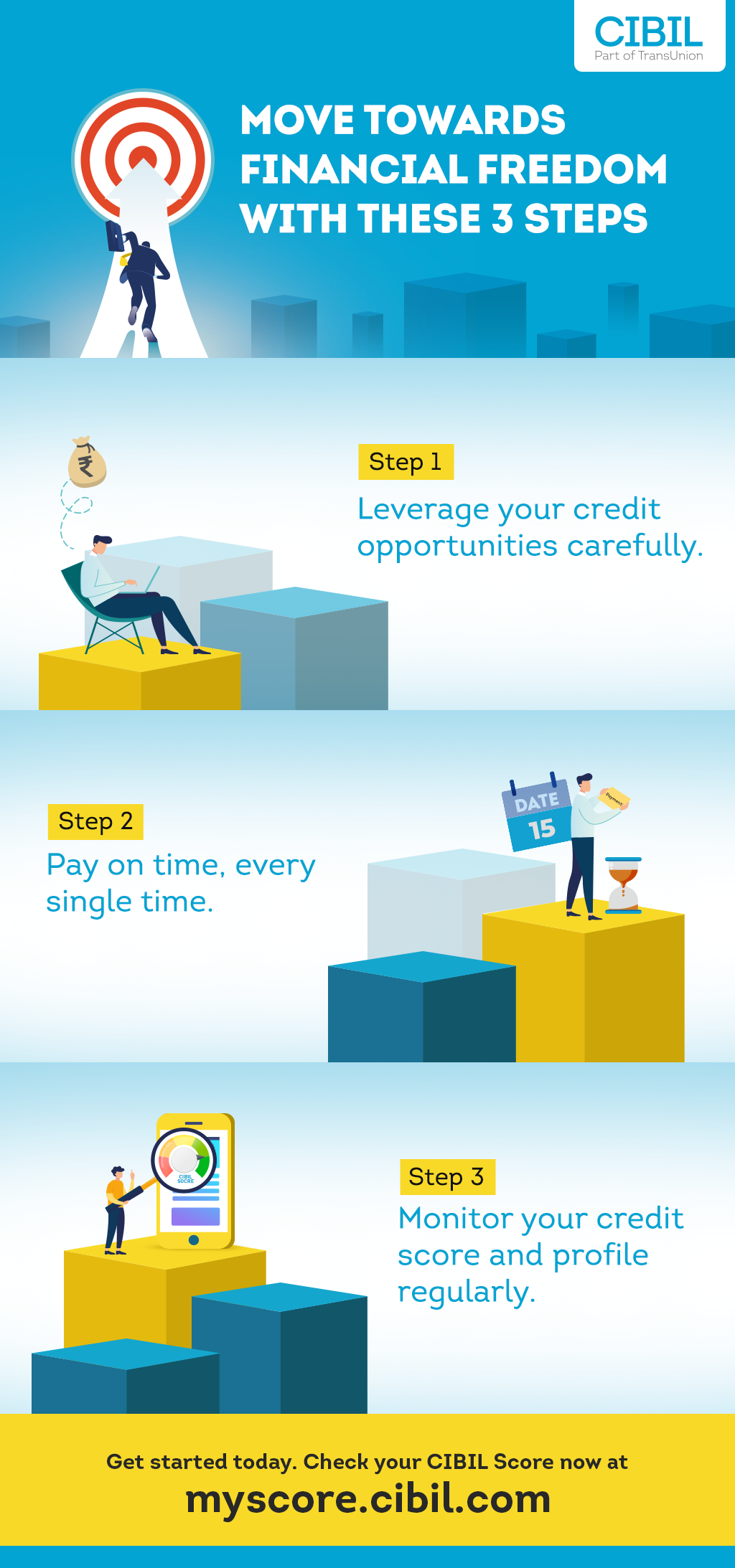Move Towards Financial Freedom With These Three Steps

As we celebrate our Independence Day, let’s pause and consider what freedom truly means for each of us. For most, the idea of freedom would be to live life on our own terms and conditions without any concerns. There are many ways to reach this idea of freedom, financial freedom being one of them. Which brings us to the question — what exactly is financial freedom? Financial freedom means having control over one’s finances and not letting it stand in the way of your dreams. It means living comfortably and having choices.
For some, these choices could include a new car, a better education for your children or a bigger home. It could also be all of them. Today, easy access to credit plays a big role in enabling financial freedom. And a key lever to help you with your credit requirements is your credit score. This score is based on your credit history and repayment behavior as reported by banks and other lenders to the four credit bureaus in India. Monitoring and maintaining a high credit score is important especially because the higher your score, the better are the chances of a loan approval.
Here are 3 key steps you can take to build and maintain a high credit score and move towards financial freedom:
Step 1: Leverage your credit opportunities carefully.
- Apply for credit cautiously. While you may have many lenders offering you a variety of different credit cards and loan opportunities, always remember to apply for new loans in moderation. This helps lenders know that you are not always credit-hungry.
- Maintain a carefully balanced mix of secured (such as home loan and auto loan) and unsecured loans (such as personal loans, consumer durables and credit cards).
- Don’t exceed more than 30% of your credit limit. Just because you have a credit card, you don’t have to maximize the credit utilization limit. Control your utilization and don’t go overboard.
Step 2: Pay on time, every single time.
- Always remember to pay your credit card invoices and EMIs on time, every single time. A single late payment can snowball into a much larger amount just because you missed the payment due date and it now attracts interest and late payment fees. This is also viewed negatively by lenders.
Step 3: Monitor your credit score and profile regularly.
- Someone else’s negligence could affect your credit score as well as your access to credit when you need it. If you have stood as a co-signee or guarantor for someone else’s loan, ensure you monitor all co-signed, guaranteed and joint accounts You can held equally liable for any missed payments in these accounts.
- Monitor your CIBIL Score and Report regularly. If you notice any incorrect information or misrepresentation, highlight these inaccuracies, rather than get an unpleasant surprise in the form of a rejected loan application. A high score also allows you to be loan-ready when the opportunity arises.

Remember that financial freedom can be facilitated by access to credit, and this access is determined by a high CIBIL Score. Start working towards your goals and financial freedom today.
Happy Independence Day, everyone!
>> Move towards financial freedom by being credit-conscious. Start monitoring your CIBIL Score and Report today - Subscribe Now!
Stay credit-ready by monitoring your CIBIL Score & Report.
Disclaimer: The information posted on this blog (Information) is prepared by TransUnion CIBIL Limited (TU CIBIL). This Information is for generic informational purposes only and is meant for consumer education and awareness about credit scores, credit history and credit reporting. The Information posted on the blog does not constitute credit advice and the user will need to consider the same and take independent informed decisions . No part of this Information may be quoted out of context, distorted ,distributed, published and/ or reproduced in any form and manner whatsoever. Consumers are advised that the Credit Information Reports (CIRs) prepared by TU CIBIL are based on collation of information, substantially, provided by credit institutions who are members with TU CIBIL. TU CIBIL is not responsible and /or liable for errors and/or omissions caused by inaccurate or inadequate information submitted to it by credit institutions. TU CIBIL does not guarantee the adequacy or completeness of the Information and/or its suitability for any specific purpose nor is TU CIBIL responsible for any access or reliance on the Information. TU CIBIL expressly disclaims all such liability. Further, this Information is based on the data available with TU CIBIL at the time of publication and therefore may not be up-to-date.